Hyundai Motor Company today revealed details about its new generation KONA subcompact SUV with information about the global model coming in March.
(more…)Tag: Hyundai
-
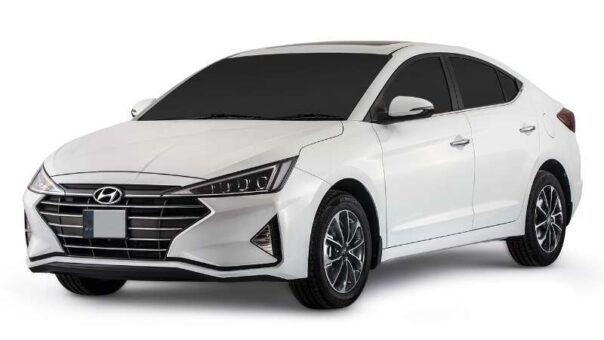
Price, specs of Hyundai Elantra in Pakistan
Hyundai Elantra was launched in Pakistan in March, 2021. The car is locally manufactured by Hyundai Nishat Motor (Private) Limited.
(more…) -
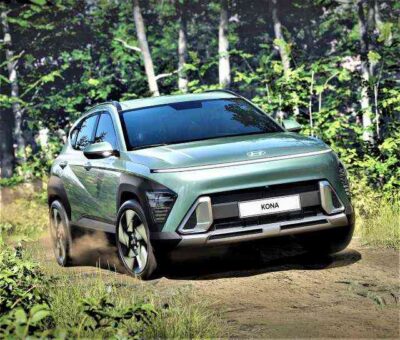
Hyundai launches futuristic designed KONA
Hyundai Motor Company unveiled the all-new electric vehicle KONA with futuristic design. The SUV is available in four variants including all-electric (EV) hybrid electric (HEV), internal combustion engine (ICE) and sporty N Line.
The KONA offers maximized living space for customers in model which has grown to 4,355 mm in length, 25 mm in width and 60 mm in wheelbase length.
The SUV’s clean, distinctive nose characterizes front section’s pure volume, which contributes to model’s smooth aerodynamic performance. The pure volume is highlighted by stretched Seamless Horizon Lamp, which is pixelated on the EV variant, marking the first Hyundai model with a Pixelated Seamless Horizon Lamp that adds to the EV’s distinctive character.
The KONA’s dynamic styling is accentuated with boldly sculpted wheel arch cladding that incorporates headlamps and taillamps, reinforcing vehicle’s robust underpinning.
There are several styling variations between the powertrain variants. The EV gets pixel graphic details on intake grille and rear bumper, a pixel-inspired 19-inch alloy wheel design, black embracing line and optional black side mirrors and roof.
The ICE and HEV share a bold and rugged bumper and skid plate design, and black wheel arch cladding. The N Line boasts optional black side mirrors and roof, wing-type spoiler, more aggressive front and rear designs with wing-shaped bumper to emphasize a lower stance, distinctive 19-inch alloy wheels, twin muffler and silver side skirt.
The 12.3-inch dual wide displays and floating module impart a high-tech impression. Ambient lighting enhances the user experience and convenience. With the column type shift-by-wire relocated from the center console to behind the steering wheel, it provides an uncluttered layout and additional space for belongings in the central tunnel.
The second-row Curve-less Bench Seat reinforces KONA’s 21st century urban design. This living space offers a unique experience with maximum usability, comfort and convenience. Behind the second row is a maximized cargo space.
-
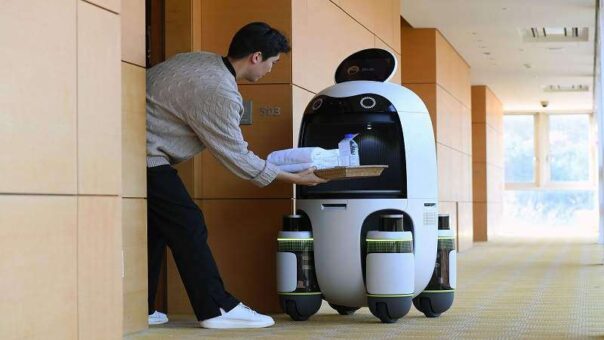
Hyundai Robots benefitted with Pilot programs for quick deliveries
SEOUL: Hyundai started two pilot delivery service programs using robots based on Plug & Drive (PnD).
These robots are available at hotels and residential-commercial complex in the suburbs of Seoul.
The delivery robot consists of a storage unit integrated on top of a PnD driving unit. Alongside the loading box used to deliver items, a connected screen displays information for customers.
READ MORE: Price, specs of MG HS 2022 in Pakistan
The robot contains one single wheel unit that combines intelligent steering, braking, in-wheel electric drive and suspension hardware, including a steering actuator for 360-degree, holonomic rotation. It moves with the aid of LiDAR and camera sensors. An integrated storage unit allows the robot to transport products to customers.
The PnD-based robot can find the optimal route within the area to deliver packages to recipients. It can recognize and avoid fixed and moving objects and drive smoothly, providing a fast delivery time.
The robot in service at the hotel uses a deep learning-based algorithm to recognize the surrounding environment and people. When the robot arrives at the room it recognizes the opening of the door, and once it perceives the recipient, it automatically opens the storage compartment for them.
The robot can communicate appropriate screen messages and in a befitting tone of voice based on the recipient. In addition, when moving between floors, the unit can determine the number of people boarding an elevator and wait for the next elevator if the first one is crowded.
The autonomous driving robot is also adept at avoiding obstacles and collisions, even in narrow hotel corridors, and can move between floors without human help due to electronic connectivity with the elevators, enabling it to deliver goods along an optimal route.
To enable the service, the Group uses wireless communication to access communal front doors and elevators, an issue which was previously an obstacle to commercializing robot delivery service. The service robot can enter the apartment complex, access upper floors through the elevator control system and deliver food to the customer’s home.
The technology enabling service robots to move autonomously indoors and outdoors and deliver food without human assistance has created a game-changing last-mile delivery innovation that is attracting significant attention from the logistics and retail industries. The company expects last-mile delivery robots to greatly increase the efficiency of the entire delivery process.
-
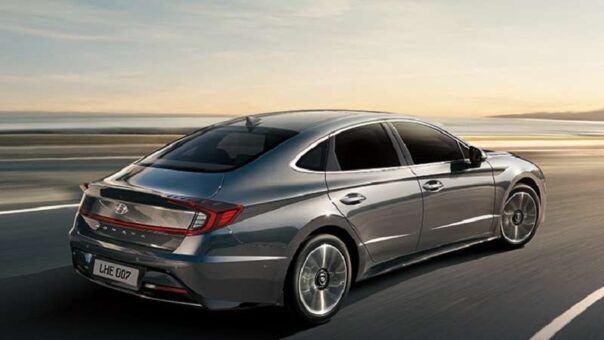
Price, specs of Hyundai Sonata in Pakistan
Hyundai Sonata was launched in Pakistan on July 06, 2021. The car is introduced with two variants Hyundai Sonata 2.0 and Sonata 2.5.
The ex-factory price of Hyundai Sonata 2.0 is Rs8,149,000 and the price of Sonata 2.5 is Rs8,899,000. The car is currently assembled by Hyundai Nishat in Pakistan.
The vehicle is introduced in variety of colors including Hampton Gray, Metallic Silver, Polar White, Diamond Black Metallic, and Oxford Blue.
The engine power of both variants is different. Hyundai Sonata 2.0 has a2000cc engine that generates a maximum power of 152/6200 Hp/Rpm at a maximum torque of 192/4500 Nm/Rpm.
The Hyundai Sonata 2.5 comes with a 2500cc engine, which generates a maximum power of 180/6000 Hp/Rpm at a maximum torque of 232/4000 Nm/Rpm. Both the variants are 2WD with 6-Speed Automatic Transmission.
The car contains five distinct driving modes for comfort. These include ECO mode, Comfort mode, Custom mode, Smart mode, and Sport mode.
The car is launched with safety features such as Hill Start Assisst Control, Electronic Stability Control, Auto Brake Hold, Electronic Parking Brake, Child ISOFIX Seat Anchors, and ABS with BA and EBD.
Sonata projects sensuous sportiness which serves as guiding concept throughout Sonata’s development.
The car has a striking presence achieved through a harmonized balance between proportion, architecture, styling and technology. Every curve and every bend add to the premium accent of the car.
The rear design contributes more towards the beauty of car. The connected LED Rear lamps incorporated with rear air fins creates a unique style and enhances aerodynamic performance.
The rear bumper design and extended LED lights provides a broad stance, giving Sonata its perfect blend of sporty and classy look.
Sonata contains new and improved powertrains mated to a six-speed automatic gearbox. Gear selection is controlled by a new shift-by-wire selector that makes for safer, more precise and fool-proof gear changes and its smaller footprint clears up valuable space on the center console.
This same push-button convenience is brought to the electronic parking brake which comes with auto-hold that allows the driver to remove his foot from the brake pedal during stops to relax the leg muscles while maintaining brake pressure.
-

Hyundai signed MOU with EV battery manufacturer
Hyundai Motor Group today signed MOU (memorandum of understanding) with SK On Co., Ltd, a leading EV battery manufacturer. They had signed to secure a supply of EV batteries in North America.
The signing of the MOU took place at SK Group Headquarters in Korea, participated by Heung-soo Kim, Executive Vice President and Head of Corporate Future Growth Planning Division & EV Division of Hyundai Motor Group and Young-chan Choi, Chief Administrative Officer of SK On.
Under the MOU, both parties will cooperate to provide SK On batteries to the Group’s plants in the U.S. after 2025 for the EV production.
READ MORE: Hyundai launch N Vision 74 Concept car
“Through the EV battery MOU, we will be able to further accelerate our efforts to secure EV leadership in the North American market,” said Executive Vice President Kim. “We expect the stable supply of EV batteries from SK On will also enable us to contribute to emissions reduction and meet climate goals in the market.”
“We expect the cooperation between SK On and Hyundai Motor Group to create a big synergy,” SK On Chief Administrative Officer Choi Young-chan said. “Both sides can hold a solid position in the process of electrification in the North American auto market.”
Hyundai Motor Group is accelerating electrification efforts with the global target to sell 3.23 million full electric vehicles annually by 2030. To realize this goal, the Group plans to establish a global EV production network that will ensure a stable supply of EVs around the globe.
-
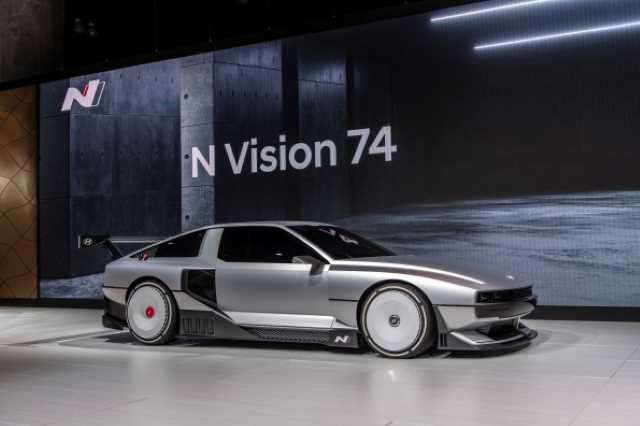
Hyundai launch N Vision 74 Concept car
Hyundai Motors launched the N Vision 74 hydrogen fuel cell hybrid concept car in the Automobility LA show.
The car represents seven years of technological development and the N brand commitment to deliver an optimistic future for car enthusiasts, regardless of propulsion type.
The company developed a unique hydrogen hybrid architecture, with the hybrid structure of a battery-electric in combination with an FCEV system, placed in an all-new layout unique to the N Vision 74.
The fuel cell stack, with an output of 85 kW (Max 95 kW), is mounted in the front, and a 62.4kWh T-type battery is mounted in the bottom to lower overall height and center of gravity. The battery retains an 800V high-speed charging architecture.
Independent, rear-mounted motors, one per wheel, generate a total power output of 500kW. This allows engineers to precision tune power distribution between left and right wheels.
N Vision 74 features dual-charging capability, and the rear-mounted 9.3 lb. capacity hydrogen fuel tanks can be refueled within five minutes. The 85kW fuel cell converts hydrogen to electricity to charge the 62kWh battery.
The battery also shares the 800V battery technology from Hyundai’s e-GMP platform with fast-charge capability.
The key development objectives of the N Vision 74 is to deliver the highest driving emotion for the driver, even under severe track conditions. The N Vision 74 unique hydrogen hybrid architecture presents unique challenges for heat management.
There are three independent cooling channels for battery, fuel cell, and motor enable optimized energy efficiency and resistance to performance degradation.
-
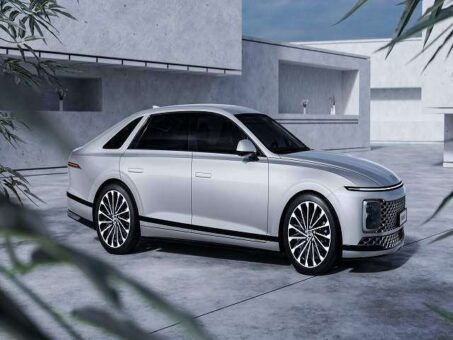
Hyundai unveiled all new design for seventh generation Grandeur
SEOUL: Hyundai Motor Company today unveiled the bold design of its seventh generation Grandeur.
It is badged as Azera in markets outside Korea. The all new model comes after six years, the sixth generation of Grandeur was launched in 2016.
Since its original debut as Hyundai’s high-end sedan in 1986, Grandeur has led the Korean sedan market, with design and innovations that stand for success and premium quality.
The seventh-generation Grandeur has evolved into a model with a new level of refinement and sophistication, full of innovative design cues and high-tech details, which reflects the great transformation happening in the mobility sector without losing sight of the model’s tremendous heritage.
READ MORE: Lexus launches new electric car UX 300e
“The seventh-generation Grandeur expresses our respect for the past and commitment to move on to the future,” said SangYup Lee, Executive Vice President and Head of Hyundai Design Center. “We are creating a new standard for the premium sedan market through emotive design and a refined customer experience.”
The All-New Grandeur’s exterior design takes inspiration from previous models and applies Hyundai Motor’s philosophy to reflect on its past while setting a course for the future.
One of the model’s most prominent aspects is its pure volume and excellent sense of proportions that balance premium and dynamic styling attributes. The All-New Grandeur is defined by a Seamless Horizon Lamp inspired by the first light of dawn, accentuating the model’s wide stance and harmonizing with its parametric jewel grill. The Seamless Horizon Lamp is a perfect fusion of technology and art and characterizes Grandeur’s future-focused design sensibility.
The large sedan’s pure volume is accentuated by a single character line that runs smoothly and horizontally from the headlamps to the rear combination lamp over clean, uncluttered body sides with frameless doors and auto-flush handles that reflect the model’s contemporary style and refinement.
Grandeur’s stretched wheelbase harmonizes with the boldly receding cowl point and C-pillar to provide an excellent sense of spaciousness as well as dynamic and sporty proportions.
The ‘Seamless Horizon’ design is also applied to the signature combination lamp that spans the taut rear end, emphasizing the model’s slim yet confident stance.
For the All-New Grandeur, Hyundai Motor created a wrap-around interior space trimmed in premium and sustainable materials to provide a clean, comfortable respite for busy lives.
The ambient mood lighting spreads softly across the door trim and the front of the dashboard, and interactive lighting on the upper right of the integrated display provides a new user experience.
The pattern details on the door trim are designed with a delicate Korean aesthetic. Together, these elements provide passengers a calming space for relaxation and recovery.
The steering wheel was also inspired by the single-spoke design of the first-generation Grandeur and reborn in its current form by integrating and rearranging controls to provide a more optimized layout for the driver. With the gear knob moved to the steering wheel, the console space provides neat and clean storage conveniences and wireless charging tailored for diverse customer lifestyles and connectivity needs.
On the sleekly styled interior surfaces, designers applied real wood, aluminum and naturally dyed Napa leather quilted in a traditional Korean pattern to provide further differentiation and refinement.
The sedan’s interior and exterior abound with sustainable materials. In addition to eco-process Napa leather, there is hygienic, anti-bacterial leather applied to various touchpoints.
-
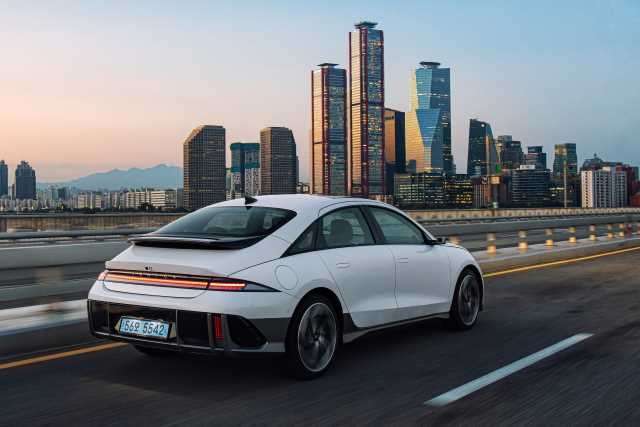
Hyundai IONIQ 6 travels 614 km per charge
SEOUL: Hyundai Motor Company declared that IONIQ 6 can travel 614 km (about 382 miles) in one time charge, according to the Worldwide Harmonized Light Vehicle Test Procedure (WLTP).
The press release issued by Hyundai Motors stated that IONIQ 6’s superb all-electric range performance is made possible in large part by Hyundai Motor Group’s dedicated architecture for EVs, Electric Global Modular Platform (E-GMP), and the electrified streamliner’s ultra-low wind resistance.
E-GMP delivers optimal electric performance and provides 800V ultra-fast charging from 10 to 80 percent in just 18 minutes and supports 400V charging without the need for additional components or adapters.
IONIQ 6 customers will benefit from Hyundai Motor Group’s commitment to develop advanced battery technology that enables stress-free driving performance and long range.
With WLTP-rated energy consumption of 13.9 kWh/100 km, IONIQ 6 will be one of the most energy-efficient electric vehicles (EV) on the market when it goes on sale later this year in select markets in Europe and next year in North America.
“From the start of IONIQ 6’s development, we set our sights on making it the leading all-electric range EV,” said Jae Ho Huh, Head of Sub-Mid Project Management Center at Hyundai Motor Company.
He also added that, “To become the global leader in electric vehicles, we are committed to providing the best possible EV performance and ownership experience.”
Having a platform specifically for EVs also means Hyundai Motor is better able to design vehicles to best meet passengers’ needs. With E-GMP, IONIQ 6 can be a workstation or a portable power bank on wheels, creating new usage scenarios to fit customers’ diverse, on-the-go lifestyles.
Hyundai Motor maximized IONIQ 6’s all-electric driving range through extensive aerodynamic design and engineering work. The vehicle’s drag coefficient of 0.21 is the lowest in the company’s vehicle lineup and one of the lowest in the industry.
The model’s streamlined appearance and various design elements, such as an active air flap, wheel air curtains, integrated rear spoiler and wheel gap reducers, significantly enhanced IONIQ 6’s aerodynamics performance, placing it among the sleekest vehicles worldwide.
In particular, wheel gap reducers minimize the empty space between the front bumper and tires to improve aerodynamic performance around the wheel wells.
This Hyundai invention made it possible for the electrified streamliner to provide a longer wheelbase for passengers’ riding comfort while simultaneously overcoming the aerodynamics challenges caused by its short front overhang.
“We put every effort into designing the most efficient car in the EV segment,” said Byung Hoon Min, Head of Total Vehicle Performance Development Center at Hyundai Motor Company.
He also added that, “Our focus on improving aerodynamics helped to achieve one of the longest all-electric range vehicles available, which will reduce customers’ EV range anxiety and help grow the segment.”
-

Retro models of Hyundai to be seen in Netflix movie
SEOUL: A new movie ‘Seoul Vibe’ of Netflix is featuring retro models of Hyundai motors.
Set during the 1988 Seoul Olympics, ‘Seoul Vibe’ features Hyundai’s first-generation Grandeur (Azera), Pony Pickup, Porter light truck, and old sedans, such as second-generation Sonata, Stellar, and Cortina, etc.
READ MORE: Ford announces global debut of 7th generation Mustang
Plus, an all-star Korean cast, including Ah-in Yoo, Kyung-pyo Go, Kyoo-hyung Lee, Ju-hyun Park, Seong-wu Ong and Jung-se Oh is leading the dynamic flow of the story. Hyundai Motor also provided a shooting location at Hyundai Wonhyoro Service Center.
This fast-paced movie is revved up with breath-taking driving scenes of Hyundai retro models, including a modified Pony Pickup with the engine from Grandeur (Azera), used by a crew of talented drivers as they join a slush fund investigation operation.
A white-colored first-generation Grandeur is also featured in the movie, symbolizing its pioneering status as the Korea’s flagship premium model. These two retro models, which gained huge popularity back in the 1980s, combine the beauty of retro and new, and act as a bridge between generations.
READ MORE: Toyota launches new redesigned Sienta minivan
In addition, Hyundai plans to unveil the silhouette of the all-new Grandeur (Azera) in photographs, through a cinematic digital advertisement in a spin-off version of ‘Seoul Vibe,’ utilizing the story and cast of the movie.
The digital advertisement spotlights the ever-evolving innovation of Grandeur, from the past to the future, and provides hidden hints about the upcoming model that is expected to launch at the end of this year. The advertisement will be available through major digital channels such as YouTube and Instagram.
“Through close collaboration with Netflix from the early stages of production, we endeavored to provide a unique atmosphere for our historic vehicles and locations with a newtro (new+retro) vibe that will appeal to every generation, including Millennial and Gen Z audiences,” said Thomas Schemera, Executive Vice President, Global Chief Marketing Officer and Head of Customer Experience Division at Hyundai Motor Company.
READ MORE: Porsche launches new Porsche 911 GT3 RS
He further said “We will continue to explore exhilarating opportunities for our customers to experience and engage with our brand through various partnerships and innovative content.”
With the film’s release, Hyundai Motor is also launching diverse experiential marketing content on digital channels, targeting millennial and Gen Z consumers and spotlighting the hipness of the brand’s retro models featured in the movie.
READ MORE: KIA Motors introduce new Executive variant of Carnival in Pakistan
To this end, Hyundai Motor also recreated the garage shown in the film on ZEPETO, the global metaverse platform, to provide a virtual experience space where visitors can assemble and drive the vehicles featured in the movie through the driving zone themed ‘Seoul Vibe.’ Plus, users will be able to meet Yoon-hee (Ju-hyun Park), a character in the movie, as a NPC (non-player character), and join a vlog event, using the first-generation Grandeur.
